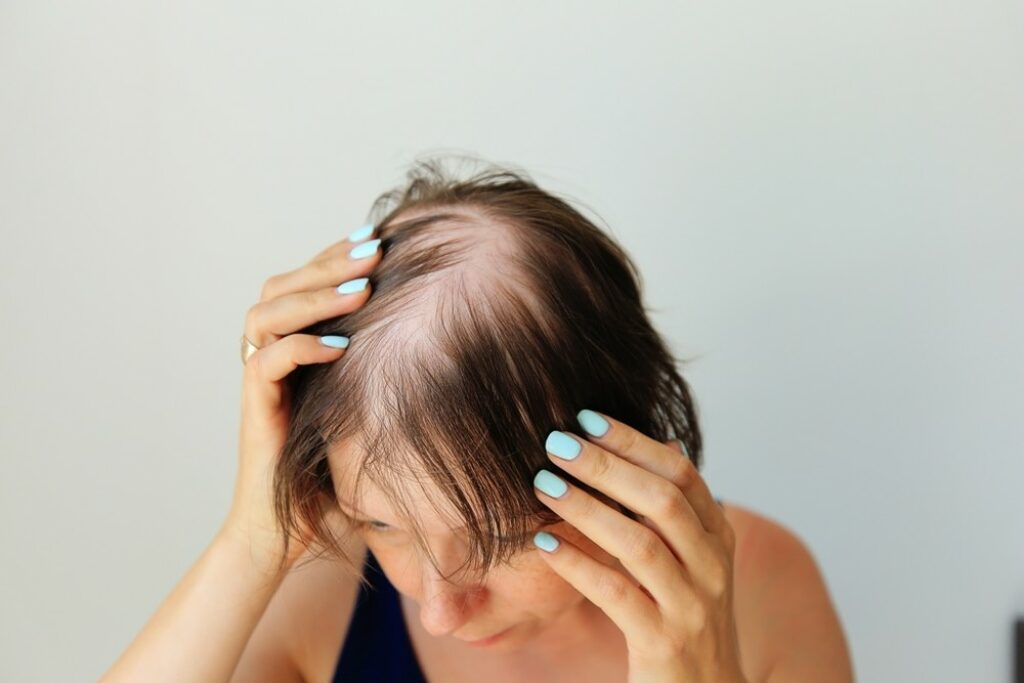
Symptoms and Treatment Of Alopecia
It’s completely natural and normal to lose around 50- 100 hairs per day. But if you have Alopecia, you will begin to notice thinning or total loss of hair. Many strands or clumps will fall out every time you brush it or take a shower.
Related Topics (Sponsored Ads):
Alopecia is a condition that affects millions of men and women around the world. It is not life threatening, but it causes significant hair thinning or total hair loss, leading to emotional distress, depression and reduced self-esteem. It can occur at any age and in various forms and levels of severity, including alopecia areata, alopecia androgenica, alopecia totalis, and alopecia universalis.
While the exact cause of alopecia is still not fully understood, extensive research indicates that it is primarily an autoimmune disorder, where the immune system is faulty and mistakes the hair follicles as foreign invaders, attacking and weakening them.

Symptoms of Alopecia
The most common symptom of alopecia is the sudden and complete loss of hair on the scalp, face, or body. This hair loss may occur in small, round patches or can progress to total hair loss on the scalp (alopecia totalis) or the entire body (alopecia universalis). In some cases, people with alopecia may experience an itching or burning sensation on the affected areas. Additionally, changes in the shape, texture, or thickness of the nails may also occur.
The symptoms of alopecia vary, depending on the type of alopecia and its severity. Some of the common symptoms of alopecia are:
-Hair loss in patches or clumps
-Bald spots on the scalp
-Thinning of hair on the scalp or other parts of the body
-Complete hair loss on the scalp or other parts of the body
-Itching or burning sensation on the scalp or affected areas
-Changes in nail shape, texture, or color
Causes and Risk Factors
The exact cause of alopecia remains unknown, but several factors are believed to contribute to its development. Genetics play a significant role, as individuals with a family history of alopecia are more likely to develop the condition.
Autoimmune disorders, such as rheumatoid arthritis and thyroid disease, can also increase the risk of alopecia, as well as hormonal changes, such as those that occur during pregnancy or menopause. Additional factors include physical and emotional stress, and certain medications, such as those used in cancer treatment.
Medical Treatments for Alopecia (Including Olumiant)
There are various medical treatments available for alopecia, depending on the type and severity of the condition. Topical medications, such as corticosteroids, can be applied directly to the affected areas to reduce inflammation and promote hair regrowth. Oral medications, such as minoxidil and finasteride, can also be prescribed to stimulate hair growth.
In more severe cases, immunotherapy may be recommended, which involves applying chemicals to the scalp to provoke an allergic reaction and stimulate hair regrowth. In some cases, hair transplant surgery may be an option to restore hair in areas of complete baldness.
A recent development in the treatment of alopecia is the introduction of Olumiant, a medication that has shown promising results in clinical trials. Olumiant, also known as baricitinib, is an oral medication that belongs to a class of drugs called Janus kinase (JAK) inhibitors. It works by inhibiting specific enzymes in the immune system, which reduces inflammation and stops the immune system from attacking the hair follicles. Olumiant has been approved by the FDA for the treatment of moderate to severe alopecia areata.
Efficacy Of Olumiant
Clinical trials have shown that Olumiant can be an effective treatment for alopecia areata. In a study involving over 500 participants with moderate to severe alopecia areata, those who took Olumiant experienced a significant increase in hair regrowth compared to those who took a placebo. The results showed that approximately 40% of participants treated with Olumiant achieved at least 50% improvement in hair regrowth.
It is important to underline that, although it has shown promising results, Olumiant may not work for everyone, and individual responses to the medication can vary. Some common side effects of this new medication include upper respiratory tract infections, nausea, and an increased risk of infections. Therefore, it is crucial to consult with a healthcare professional before starting any new medication, including Olumiant, to determine the most appropriate treatment plan and to monitor for potential side effects.
Self-Help Remedies
In addition to medical treatments, there are several self-help remedies that can help manage alopecia, reduce hair loss and promote new hair growth:
1. Maintain a balanced diet: Eating a nutritious diet that includes a variety of fruits, vegetables, whole grains, and lean proteins can provide essential vitamins and minerals that support hair health.
2. Manage stress: Stress can worsen hair loss, so finding healthy ways to manage stress, such as practicing relaxation techniques, engaging in regular physical activity, and seeking support from friends and family, can be beneficial.
3. Scalp massage: Carefully massaging the scalp with gentle circular motions can stimulate blood flow to the hair follicles, promoting hair growth. It can also help reduce stress and improve relaxation.
4. Hair care: Taking good care of the remaining hair is important. Avoid harsh chemical treatments, use gentle and organic based hair products, and avoid heat and tight hairstyles to help prevent further damage and breakage.
Final Thoughts
Alopecia can have a significant impact on a person’s self-esteem and quality of life. While there is no cure for alopecia, there are various medical treatments available, including the recently approved medication Olumiant. It is important to consult with a healthcare professional to determine the most suitable treatment plan based on individual needs and circumstances.
Additionally, while you wait for your treatment plan to take effect, it’s very beneficial to seek out support from your friends, family or local community groups with the same condition to nourish and boost your self-esteem. Have fun with wigs and hats. And always remember, you are beautiful and amazing no matter what.




